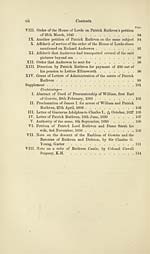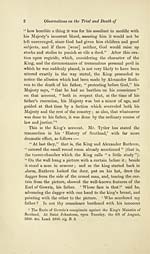Papers relating to William, first Earl of Gowrie, and Patrick Ruthven, his fifth and last surviving son
(17) [Page 1]
Download files
Complete book:
Individual page:
Thumbnail gallery: Grid view | List view
![(17) [Page 1] -](https://deriv.nls.uk/dcn17/9486/94861924.17.jpg)
OBSERVATIONS ON THE TRIAL AND DEATH OF WILLIAM,
EARL OF GOWRIE, A.D. 1584, AND ON THEIR CON-
NECTION WITH THE GOWRIE CONSPIRACY, A.D. 1600.
BY JOHN BEUCE, ESQ., F.S.A.
In King James's singular narrative of the Gowrie Conspi-
racy; his Majesty states, that Alexander Ruthven, younger
brother of John, Earl of Gowrie, having conducted him into
a chamber of Gowrie House, which the King calls " a little
studie," suddenly " locked too the studie doore behinde him,"
and at that instant, changing his countenance, put his hat on
his head, and drew a dagger from the girdle of Andrew Hen-
derson, a servant of the Ruthvens, who had been previously
stationed in the little study, clad in armour, to await his
Majesty's coming. His Majesty goes on to relate, that young
Ruthven held the point of Henderson's dagger to the king's
breast, declaring that he " behoved to be in his will, and to
be used as he list." The King adds, " that Ruthven swore
many bloody oaths that if the king cried one word, or opened
a window to look out, that dagger should presently go to his
heart." He then adds, and it is the first word which seems
to have been uttered in explanation of the cause of this sin-
gular outrage, that Alexander Ruthven affirmed " that he
was sure that now the King's conscience was burthened for
the murthering of his father." The King replied (according
to his own account) with singular coolness and self-possession.
He " begun to dilate " (these are the words of his narrative)
B
EARL OF GOWRIE, A.D. 1584, AND ON THEIR CON-
NECTION WITH THE GOWRIE CONSPIRACY, A.D. 1600.
BY JOHN BEUCE, ESQ., F.S.A.
In King James's singular narrative of the Gowrie Conspi-
racy; his Majesty states, that Alexander Ruthven, younger
brother of John, Earl of Gowrie, having conducted him into
a chamber of Gowrie House, which the King calls " a little
studie," suddenly " locked too the studie doore behinde him,"
and at that instant, changing his countenance, put his hat on
his head, and drew a dagger from the girdle of Andrew Hen-
derson, a servant of the Ruthvens, who had been previously
stationed in the little study, clad in armour, to await his
Majesty's coming. His Majesty goes on to relate, that young
Ruthven held the point of Henderson's dagger to the king's
breast, declaring that he " behoved to be in his will, and to
be used as he list." The King adds, " that Ruthven swore
many bloody oaths that if the king cried one word, or opened
a window to look out, that dagger should presently go to his
heart." He then adds, and it is the first word which seems
to have been uttered in explanation of the cause of this sin-
gular outrage, that Alexander Ruthven affirmed " that he
was sure that now the King's conscience was burthened for
the murthering of his father." The King replied (according
to his own account) with singular coolness and self-possession.
He " begun to dilate " (these are the words of his narrative)
B
Set display mode to:
![]() Universal Viewer |
Universal Viewer | ![]() Mirador |
Large image | Transcription
Mirador |
Large image | Transcription
Images and transcriptions on this page, including medium image downloads, may be used under the Creative Commons Attribution 4.0 International Licence unless otherwise stated. ![]()
| Histories of Scottish families > Papers relating to William, first Earl of Gowrie, and Patrick Ruthven, his fifth and last surviving son > (17) [Page 1] |
|---|
| Permanent URL | https://digital.nls.uk/94861922 |
|---|
| Description | A selection of almost 400 printed items relating to the history of Scottish families, mostly dating from the 19th and early 20th centuries. Includes memoirs, genealogies and clan histories, with a few produced by emigrant families. The earliest family history goes back to AD 916. |
|---|

